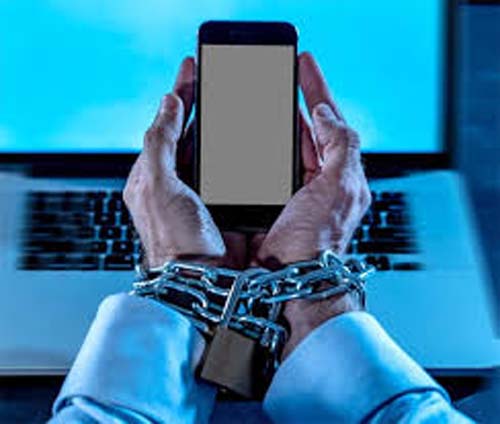
Smartphone addiction: Compulsive usage of electronic gadgets harmful for mental health
Taj Nabi Khan
Islamabad: Smartphone, once considered a privilege in the hands of a few, has now become such a commonplace phenomenon that there could hardly be anyone without having a mobile phone except perhaps some domestic women that too might be living in some faraway corners of the country.
It was during the last two decades or so that the gadgets had become an integrated part of everyday life.
It has also undergone drastic changes with pace of the ongoing technological advancement. However, the extreme use of the pocket-sized minicomputer had harmful effects on almost everyone in general and children in particular. It is also due to the fact that smartphone users now access the internet more frequently via mobile phones than through other devices such as laptops and desktop computers. Like elsewhere, in Pakistan too, the virtual space has exponentially expanded, especially when people were restricted to their homes during the coronavirus pandemic. The only choice people were left with was to interact with others through electronic gadgets.
However, when the mode of socialization was changed from real to virtual, the high-tech electronic world had also brought about a number of mental and psychological health repercussions. For parents, it is irrational to stop children from mobile phone usage as they themselves were unable to refrain from the modern telecommunication device. Nevertheless, this modern day necessity has somewhat affected the new generation entirely.
It is hard to imagine a life without a mobile phone but for others it is somehow a new luxury to live sometimes away from it.
However, it is only possible when it was either completely switched off, kept aside, or probably the signals are lost/dropped.
Only that gadget free time makes the users able to take a sigh of relief. But for a long time it seems almost impossible to stay disconnected in the global village. No doubt, it is an easy tool to distract the attention of kids and engage them with the device but it has also a number of health hazards as it affects their mental and psychological health, loss in weight and eyesight, and brain functions.
The World Health Organization (WHO) has classified cell phone radiation as ‘possibly carcinogenic to humans’. It argues that children absorb more than 60 percent of the radiation into the brain than adults as their brain’s thinner skin, tissues, and bones allow them to absorb the radiation twice than the grown-ups. Therefore, their developing nervous system makes them more vulnerable to this ‘carcinogen’.
Professor Dr. M. Tahir Khalily Islamabad based Clinical Psychologist, who recently published his book “Gadget Free Life”, a step-by-step guide to recognize and deal with mobile phone addiction has said that the smartphone addiction was just like drug addictions. While sharing statistics, he said, “Pakistan has the highest usage of smartphone i.e., 55.7% as compared to other countries i.e., Switzerland 16.90%, Spain 12.50%, France 21.59%, UK 10%, India 39.44% and Korea 35.20%.”
He said that the study has assessed 12 sessions of indigenously adapted cognitive– behavioral therapy for excessive smartphone use (IACBT-ESU). He said that a single-blind randomized controlled trial was conducted in students (12 to 19 years of age) to examine the potential beneficial effects of IACBT-ESU (n= 62). The symptoms of depression, anxiety, stress, and peer relations were also compared between the two groups, he added.
Dr. Khalily said that the IACBT-ESU group demonstrated significant reductions in excessive smartphone use with reduced symptoms of depression, anxiety, stress, hyperactivity, and emotional difficulties at both trial end and at 3-month follow-up compared with control participants. The IACBT-ESU was associated with reduced excessive smartphone use and improved psychological well-being with beneficial findings maintained three months after the trial’s end, he added. A resident of Islamabad Sajjad Ali while talking to the agency has said that the addictive use of the device caused depression, anxiety, mental stress, sleep disorders, headache, shortness of temper, decreased attention, road accidents and wastage of precious time.
He said, “We have not yet learnt the proper use of mobile phone technology.” It was essential for parents to monitor the online stuff watched by their kids on the electronic gadgets to avoid long term issues, he added.
